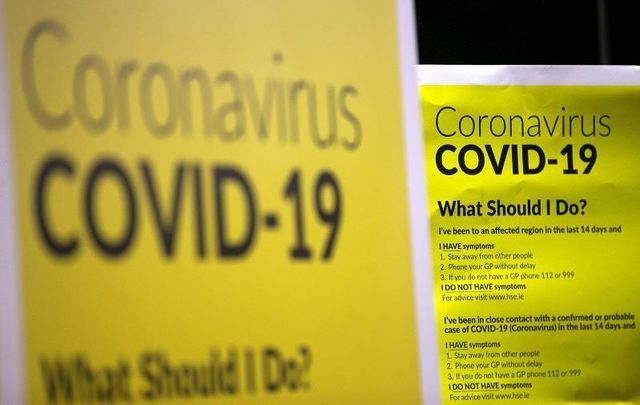The World Health Organization declared coronavirus a pandemic on Wednesday as the Republic of Ireland confirms nine new cases.
The first coronavirus death has been confirmed in the Republic of Ireland the same day that the World Health Organization officially declared the virus a pandemic.
Read More: Coronavirus patient in Ireland speaks out; Irish authorities say no to lockdown for now
In a statement issued on March 11, Ireland’s Health Service Executive (HSE) said: “The Health Protection Surveillance Centre has today been informed that a patient diagnosed with COVID-19 in Ireland has passed away.
“This is the first recorded death relating to COVID-19 reported in Ireland.
Dr. Tony Holohan, Chief Medical Officer, Department of Health, said: "I would like to extend my condolences to the family and friends of this patient.
"I urge the media and the public to respect their privacy at this difficult time.
"We continue our efforts to interrupt the transmission of this virus. It will take all of us, collectively to succeed. Please continue to follow public health advice."
While the patient’s identity is not being released, The Irish Times reports: “The patient died earlier on Wednesday in a hospital in the east of the country, where they were being treated in recent days.
“It is understood the patient initially presented with respiratory symptoms and was later diagnosed with the disease when staff decided to perform a test.”
Read More: All St. Patrick's Day parades in Ireland canceled due to coronavirus
Newly confirmed cases of coronavirus in Ireland
On Wednesday evening, health officials in Ireland said that nine new cases of coronavirus have been confirmed, bringing the total number of cases to 43.
The HPSC says the new cases are:
• 4 males, from the south of the country, associated with travel
• 1 female, from the south of the country, contact with a confirmed case
• 1 male, south of the country, contact with a confirmed case
• 3 males, from the east of the country, two associated with travel, one associated with contact of a confirmed case
BREAKING: Nine new cases of Covid-19 have been diagnosed here by the Department of Health | Read more: https://t.co/zvMhLoNrJz https://t.co/yqTnjNmi8p
— RTÉ News (@rtenews) March 11, 2020
In Northern Ireland, there are 18 confirmed cases as of Wednesday afternoon. 246 tests have been concluded in the region, of which 228 were negative.
Paul Reid, the CEO of Ireland’s Health Service Executive (HSE), said earlier on Wednesday that Ireland is moving into “a new phase” regarding coronavirus:
We are entering a new phase in #Covid19. I fully support our hospitals who have to make decisions on restricting visitors based on clinical risk, patient and public safety. Please do as we urge and our ask will increase as we progress. @HSELive
— Paul Reid (@paulreiddublin) March 11, 2020
Read More: 1.9 million Irish could get Coronavirus: report
WHO declares coronavirus a pandemic
Ireland’s first coronavirus death comes the same day that the World Health Organization (WHO) officially declared the situation a pandemic.
In a briefing on March 11, WHO's Director-General Dr. Tedros Adhanom Ghebreyesus said: “WHO has been assessing this outbreak around the clock and we are deeply concerned both by the alarming levels of spread and severity, and by the alarming levels of inaction.
“We have therefore made the assessment that COVID-19 can be characterized as a pandemic.
“Pandemic is not a word to use lightly or carelessly. It is a word that, if misused, can cause unreasonable fear, or unjustified acceptance that the fight is over, leading to unnecessary suffering and death.
“Describing the situation as a pandemic does not change WHO’s assessment of the threat posed by this virus. It doesn’t change what WHO is doing, and it doesn’t change what countries should do.
“We have never before seen a pandemic sparked by a coronavirus. This is the first pandemic caused by a coronavirus. And we have never before seen a pandemic that can be controlled, at the same time.
“WHO has been in full response mode since we were notified of the first cases. And we have called every day for countries to take urgent and aggressive action.
“We have rung the alarm bell loud and clear.”
Read More: Confirmed coronavirus cases in Republic of Ireland more than doubles in one day
He added: “We cannot say this loudly enough, or clearly enough, or often enough: all countries can still change the course of this pandemic.
“If countries detect, test, treat, isolate, trace, and mobilize their people in the response, those with a handful of cases can prevent those cases becoming clusters, and those clusters becoming community transmission.
“Even those countries with community transmission or large clusters can turn the tide on this virus.”
“All countries,” the Director-General said, “must strike a fine balance between protecting health, minimizing economic and social disruption, and respecting human rights.
“WHO’s mandate is public health. But we’re working with many partners across all sectors to mitigate the social and economic consequences of this pandemic.
Tedros said that coronavirus is not just a public health crisis, but a crisis that will "touch every sector."
“I have said from the beginning that countries must take a whole-of-government, whole-of-society approach, built around a comprehensive strategy to prevent infections, save lives and minimize impact.
“I remind all countries that we are calling on you to activate and scale up your emergency response mechanisms; communicate with your people about the risks and how they can protect themselves – this is everybody’s business.
"Find, isolate, test and treat every case and trace every contact; Ready your hospitals; Protect and train your health workers.
“And let’s all look out for each other, because we need each other,” he concluded. “We’re in this together, to do the right things with calm and protect the citizens of the world. It’s doable.”
As of March 11, there are more than 121,000 confirmed cases of coronavirus and more than 4,300 deaths worldwide. More than 66,000 cases have recovered.




Comments